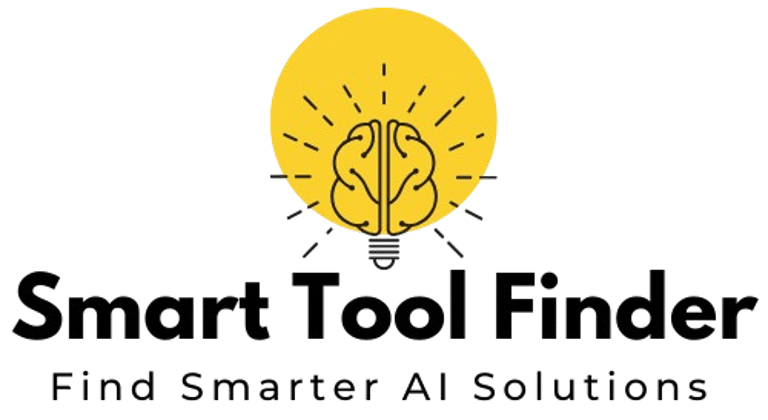Best AI Courses in 2025: Courses For Beginners To Pros!
BEST AI COURSES
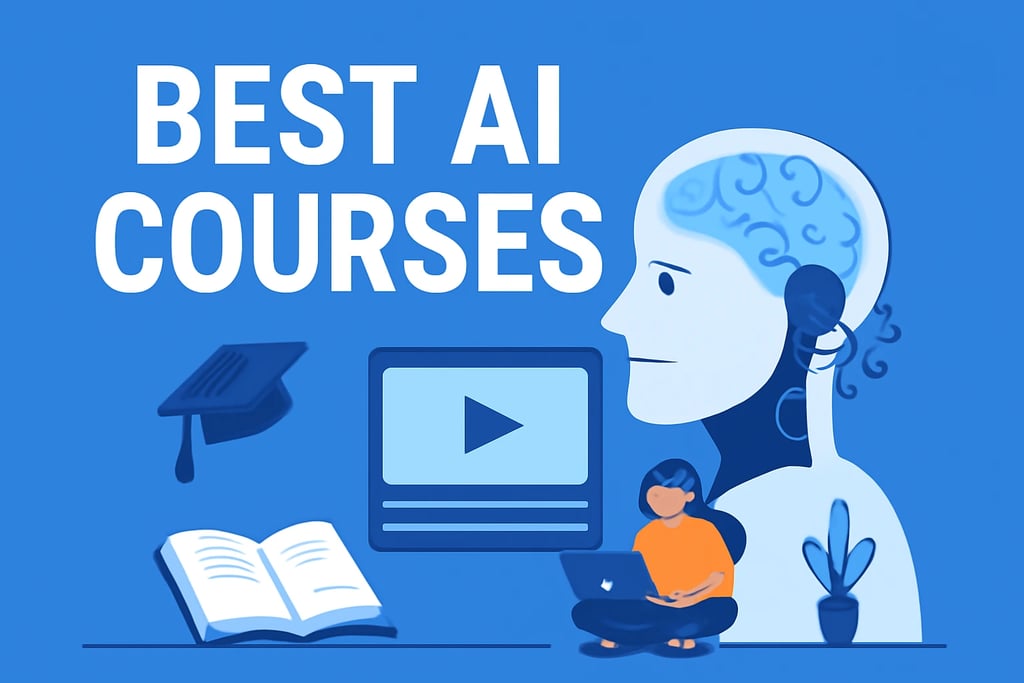

Artificial intelligence is no longer just sci-fi—it’s powering everything from voice assistants to self-driving cars. With AI skills in high demand (a 2024 World Economic Forum report predicts AI will create millions of jobs by 2030), now’s the time to dive in. But with so many online courses out there, how do you pick the best AI course for you?
Whether you’re a beginner curious about machine learning, a professional upskilling for a data science role, or a coder diving into deep learning, this guide is your roadmap.
We’ll explore the best AI courses across top platforms, break down what makes them shine, and help you pick the best based on your goals, budget, and learning style.
From free intros to advanced certifications, we’ve got you covered.
Let’s find your perfect AI course!
Here's A Quick Overview:
Why Learn AI in 2025?
AI isn’t just a buzzword—it’s a career game-changer. Here’s why learning AI now is a smart move:
Explosive Demand: AI roles like data scientists and machine learning engineers command salaries averaging $120,000–$150,000, per Glassdoor.
Versatility: AI skills apply across industries—healthcare, finance, gaming, you name it.
Future-Proofing: As AI evolves, staying updated keeps you competitive.
Accessibility: Online platforms make top AI certifications and courses available to anyone, anywhere.
But not all courses are created equal. Let’s figure out how to pick the right one.
How to Choose the Right AI Course for You
With so many AI courses found on the internet, the best one really depends on you. Here are a few things to think about before choosing:
Your goals: Are you switching careers, sharpening your skills, or focusing on something specific like NLP or computer vision?
Your experience level: If you're new to AI, start with the basics. If you’ve got a background already, look for more advanced topics.
Your schedule: Can you commit around 10 hours a week, or do you need something that lets you learn at your own pace?
Your budget: Free courses are a great start, but paid options often come with extras like certifications and hands-on projects.
Your learning style: Do you learn best from videos, hands-on coding, or interacting with others in forums?
Real-world projects: Courses that include things like building a chatbot can really help you apply what you learn.
Certifications: Certificates from well-known universities or institutions can carry more weight with employers.
Pro tip: Always check reviews and the course syllabus to make sure it fits your needs.
Now, let’s take a look at some of the top AI courses available on leading platforms.
The Best AI Courses Across Top Platforms
We’ve handpicked 1–2 standout AI courses or programs from each platform, focusing on quality, relevance, and learner feedback. Here’s our deep dive into Coursera, Udemy, edX, Simplilearn, Datacamp, LinkedIn Learning, Skillshare, Brilliant.org, FutureLearn, Great Learning, and Pluralsight.
1. Coursera: Academic Excellence


Coursera partners with universities like Stanford and tech giants like IBM, offering structured, career-focused AI programs.
Course: Machine Learning Specialization (Stanford)
Overview: Led by Andrew Ng, this Specialization covers supervised/unsupervised learning, neural networks, and best practices.
Key Features: 3 courses, hands-on labs, Python programming, certificate.
Pros: Academic rigor, job-ready skills, globally recognized certificate.
Cons: Requires 3–6 months, $39–$79/month subscription.
Best For: Aspiring data scientists or career changers seeking credibility.
Course: AI for Everyone
Overview: A non-technical intro to AI concepts, workflows, and business applications.
Key Features: 6 hours, no coding, certificate from DeepLearning.AI.
Pros: Beginner-friendly, quick, affordable (~$49 one-time).
Cons: Lacks hands-on projects, basic for techies.
Best For: Absolute beginners or managers exploring AI.
Why Choose Coursera? Its university-backed top AI certifications and structured paths are perfect for serious learners.
2. Udemy: Affordable and Practical
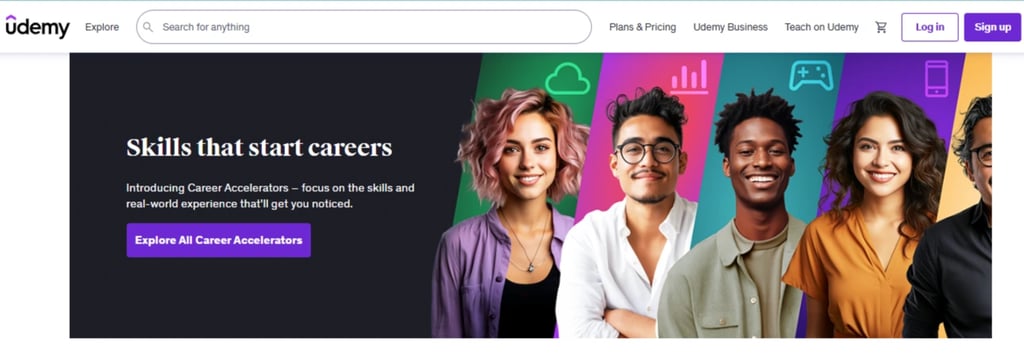

Udemy’s marketplace model offers thousands of AI courses, often at budget-friendly prices during sales.
Course: Machine Learning A-Z: AI, Python & R
Overview: Covers machine learning, data preprocessing, and algorithms like regression and clustering.
Key Features: 44 hours, hands-on coding, lifetime access, certificate.
Pros: Practical, beginner-to-intermediate, ~$15 during sales.
Cons: Instructor quality varies, less structured than Coursera.
Best For: Self-starters wanting hands-on Python skills.
Course: Artificial Intelligence: Reinforcement Learning in Python
Overview: Deep dive into reinforcement learning, a key AI subfield.
Key Features: 14 hours, coding projects, advanced focus.
Pros: Niche topic, practical, affordable.
Cons: Requires Python/ML knowledge beforehand, less community support.
Best For: Intermediate coders specializing in AI.
Why Choose Udemy? It’s a great option for AI for beginners or pros seeking niche topics on a budget.
3. edX: Academic and Flexible


edX collaborates with universities like MIT and Harvard, blending academic depth with flexible pacing.
Course: Artificial Intelligence (AI) by Columbia University
Overview: Covers AI fundamentals, search algorithms, and neural networks.
Key Features: 12 weeks, Python projects, verified certificate (~$199).
Pros: Rigorous, project-based, prestigious credential.
Cons: Time-intensive, costly certificate.
Best For: Intermediate learners aiming for a strong portfolio.
Course: CS50’s Introduction to Artificial Intelligence with Python
Overview: Harvard’s intro to AI, focusing on algorithms and Python.
Key Features: 7 weeks, free to audit, hands-on projects.
Pros: Free option, engaging, beginner-friendly.
Cons: Certificate costs extra, fast-paced.
Best For: Beginners with some coding experience.
Why Choose edX? Its mix of free audits and premium credentials suits academic-minded learners.
4. Simplilearn: Career-Oriented Certifications
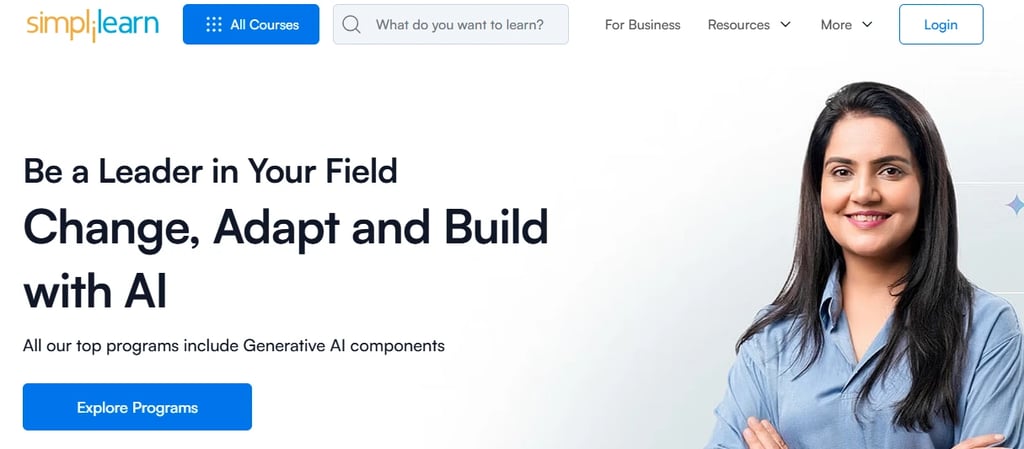

Simplilearn focuses on job-ready skills, often with industry partners like IBM.
Course: Artificial Intelligence Engineer Master’s Program
Overview: Covers ML, deep learning, NLP, and computer vision.
Key Features: 200+ hours, live classes, IBM certificate, job assistance.
Pros: Comprehensive, career-focused, hands-on labs.
Cons: Expensive (~$1,999), demanding schedule.
Best For: Career changers targeting AI engineering roles.
Why Choose Simplilearn? Its intensive programs are built for job-seekers with bigger budgets.
5. Datacamp: Data Science and AI
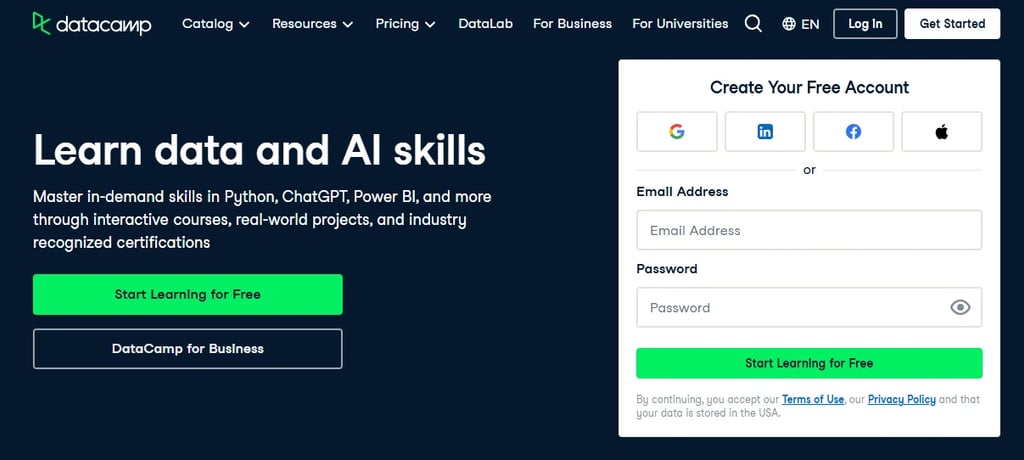

Datacamp specializes in data skills, with interactive, bite-sized AI lessons.
Course: Introduction to Machine Learning with Python
Overview: Teaches ML basics, from data prep to model evaluation.
Key Features: 4 hours, interactive coding, subscription-based (~$25/month).
Pros: Quick, hands-on, beginner-friendly.
Cons: Subscription model, less depth for advanced learners.
Best For: Beginners or data analysts new to AI.
Why Choose Datacamp? Its interactive approach suits data-focused learners starting out.
6. LinkedIn Learning: Professional Upskilling


LinkedIn Learning offers concise, career-oriented AI courses.
Course: Artificial Intelligence Foundations: Machine Learning
Overview: Intro to ML concepts, algorithms, and applications.
Key Features: 2 hours, certificate, LinkedIn profile integration (~$39/month).
Pros: Quick, professional, great for resumes.
Cons: Surface-level, subscription-based.
Best For: Professionals upskilling quickly.
Why Choose LinkedIn Learning? It’s perfect for busy pros needing quick, polished courses.
7. Skillshare: Creative AI Applications


Skillshare leans into creative and accessible learning, with some AI gems.
Course: AI for Creatives: Using AI Tools in Art & Design
Overview: Explores AI tools like DALL·E for creative projects.
Key Features: 1 hour, project-based, ~$15/month subscription.
Pros: Unique, beginner-friendly, creative focus.
Cons: Not technical, limited AI depth.
Best For: Artists or marketers exploring AI tools.
Why Choose Skillshare? It’s great for non-technical creatives dabbling in AI.
8. Brilliant.org: Interactive Problem-Solving
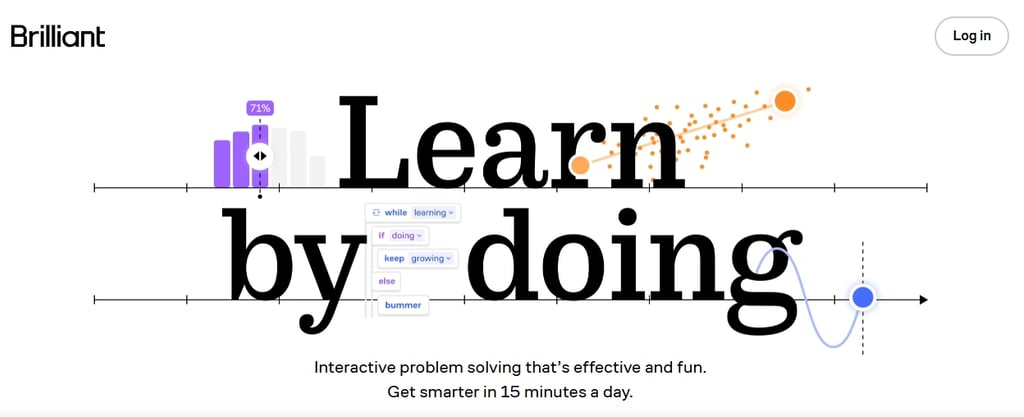

Brilliant.org uses interactive puzzles to teach AI and math concepts.
Course: Artificial Neural Networks
Overview: Covers neural network basics through hands-on problems.
Key Features: ~5 hours, interactive, ~$24/month subscription.
Pros: Engaging, intuitive, great for visual learners.
Cons: Less coding, subscription-based.
Best For: Beginners who love interactive learning.
Why Choose Brilliant.org? Its puzzle-based approach makes AI fun and accessible.
9. FutureLearn: Academic and Collaborative


FutureLearn partners with universities for flexible, social learning.
Course: Artificial Intelligence: Ethics and Societal Challenges
Overview: Explores AI’s ethical implications and societal impact.
Key Features: 4 weeks, free to audit, certificate (~$99).
Pros: Unique focus, collaborative forums, free option.
Cons: Not technical, limited hands-on.
Best For: Learners interested in AI ethics.
Why Choose FutureLearn? It’s ideal for exploring AI’s broader implications.
10. Great Learning: Free and Career-Focused
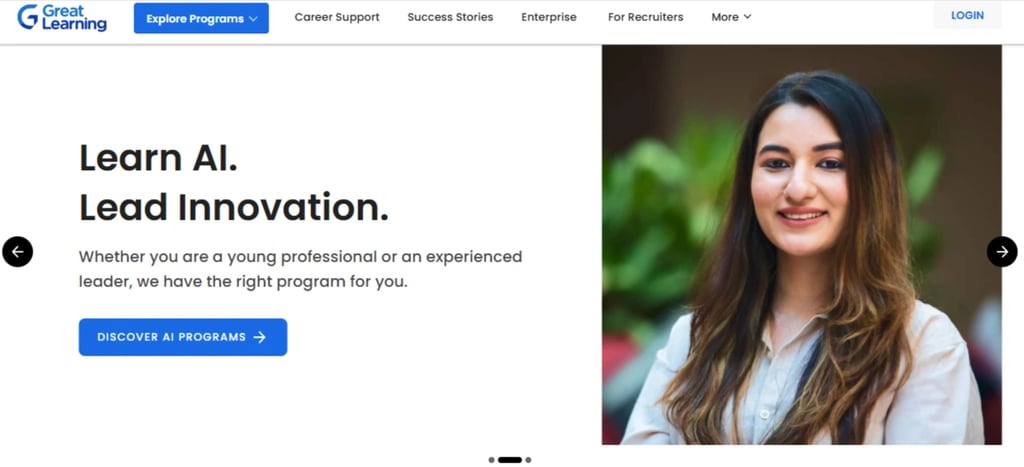

Great Learning offers both free and paid AI courses, many with connections to industry.
Course: Introduction to Artificial Intelligence (Free)
What it covers: The basics of AI, machine learning, and how they’re used in the real world.
Key Features: About 2 hours long, video-based class, and includes a free certificate.
Pros: It’s free, very easy to follow, and great for beginners.
Cons: It’s quite basic and doesn’t go deep enough for more advanced learners.
Best for: Total beginners who want a quick, no-risk introduction to AI.
Why Choose Great Learning? Its free AI courses are a low-risk starting point.
11. Pluralsight: Tech-Savvy Professionals
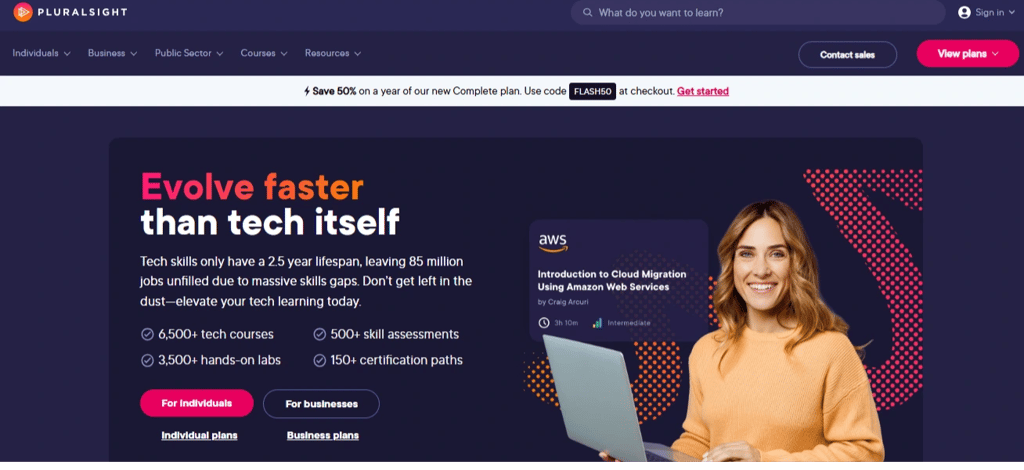

Pluralsight targets IT and tech pros with advanced AI courses.
Course: Building Machine Learning Models in Python
Overview: Teaches ML model development with Python libraries.
Key Features: 3 hours, hands-on, ~$29/month subscription.
Pros: Technical, project-focused, great for coders.
Cons: Subscription-based, intermediate level.
Best For: Python programmers upskilling in ML.
Why Choose Pluralsight? It’s tailored for tech pros seeking advanced skills.
Finding Your AI Niche
AI is vast, with subfields like NLP, computer vision, and reinforcement learning. Here’s how platforms cater to specific areas:
Natural Language Processing (NLP): Coursera’s “Natural Language Processing Specialization” (DeepLearning.AI) is a standout for chatbots and text analysis.
Computer Vision: Udemy’s “Deep Learning and Computer Vision A-Z” excels for image recognition projects.
Reinforcement Learning: edX’s “CS50’s Introduction to AI” and Udemy’s “Reinforcement Learning in Python” dive into this advanced topic.
Ethics and Business: FutureLearn’s ethics course and Coursera’s “AI for Everyone” suit non-technical learners.
Free vs. Paid AI Courses: What’s the Difference?
Free Courses: Platforms like Great Learning and edX (through their audit option) are great for trying out AI. They’re short, easy to access, and good for getting a feel for the subject—but they usually don’t go very deep or include real projects.
Paid Courses: Options from Coursera, Simplilearn, and Pluralsight offer more value with certifications, hands-on practice, and structured learning. You’re paying for a more complete and credible learning experience.
Beyond Courses: Building Your AI Portfolio
Courses are just the start. To stand out:
Build projects (e.g., a sentiment analysis model or image classifier).
Share code on GitHub.
Contribute to open-source AI projects.
Network on LinkedIn, showcasing your certificates.
Conclusion: Your Path to the Best AI Course
The best AI courses in 2025 cater to every learner, from curious beginners to seasoned coders.
Coursera shines for career-focused, university-backed programs, while Udemy offers affordable, practical skills. edX and Great Learning provide free or flexible options, and Simplilearn targets job-seekers.
Niche platforms like Datacamp, Skillshare, or Brilliant.org cater to specific needs—data science, creativity, or interactive learning.
Your perfect course depends on your goals. Want a resume-boosting credential? Go for Coursera or Simplilearn. On a budget? Udemy or Great Learning. Diving into a subfield like NLP? Check Coursera or Udemy.
Whatever you choose, the most important key is to start, practice, and build projects.
About Author:


Hey, I’m Diana R.K ! I’m a digital marketing strategist and a huge fan of all things AI. I’ve spent a lot of time exploring online courses to help people like you dive into the world of artificial intelligence. Whether you're just starting out or looking to level up your skills, I’m here to share honest reviews and tips to help you choose the best AI courses out there. Let’s make learning AI as simple and enjoyable as possible!
